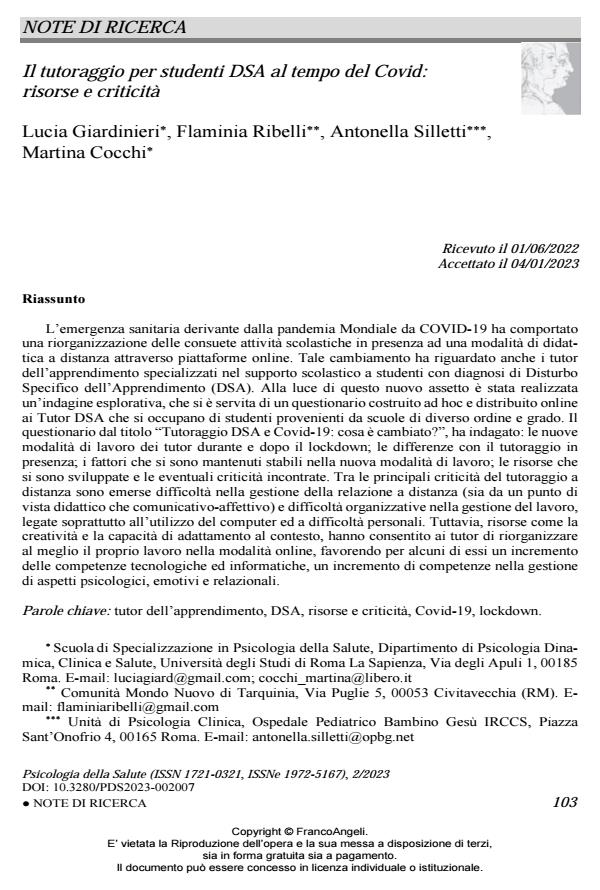Il tutoraggio per studenti DSA al tempo del Covid: risorse e criticità
Journal title PSICOLOGIA DELLA SALUTE
Author/s Lucia Giardinieri, Flaminia Ribelli, Antonella Silletti, Martina Cocchi
Publishing Year 2023 Issue 2023/2
Language Italian Pages 15 P. 103-117 File size 264 KB
DOI 10.3280/PDS2023-002007
DOI is like a bar code for intellectual property: to have more infomation
click here
Below, you can see the article first page
If you want to buy this article in PDF format, you can do it, following the instructions to buy download credits

FrancoAngeli is member of Publishers International Linking Association, Inc (PILA), a not-for-profit association which run the CrossRef service enabling links to and from online scholarly content.
The health emergency resulting from the global COVID-19 pandemic has led to a reorgan-ization of the usual face-to-face learning towards a remote teaching method through online platforms. This change also involved the learning tutors specialized in school support for stu-dents diagnosed with Specific Learning Disorder (SLD). With this in mind, an exploratory survey was carried out, which made use of a questionnaire created ad hoc and distributed online to SLD Tutors who deal with students from schools of all levels. The questionnaire entitled "SLD and Covid-19 tutoring: what has changed?" investigated the new working methods of tutors during and after the lockdown, the differences with face-to-face tutoring, the factors that have remained stable in the new way of working and the resources that have developed along with any critical issues encountered. Among the main criticalities of distance tutoring, difficulties emerged in the management of the distance relationship (both from an ed-ucational and communicative-affective point of view), as well as organizational difficulties in managing the work, which are mainly related to the use of computers and personal difficulties. On the other hand, resources such as creativity and the ability to adapt to the context have al-lowed tutors to better reorganize their work in an online mode, so as to foster an increase in technological and IT skills, and resulting in an enhancement of psychological, emotional, and relational aspects management.
Keywords: learning tutor, SLD, resources and criticalities, Covid-19, lockdown.
Lucia Giardinieri, Flaminia Ribelli, Antonella Silletti, Martina Cocchi, Il tutoraggio per studenti DSA al tempo del Covid: risorse e criticità in "PSICOLOGIA DELLA SALUTE" 2/2023, pp 103-117, DOI: 10.3280/PDS2023-002007